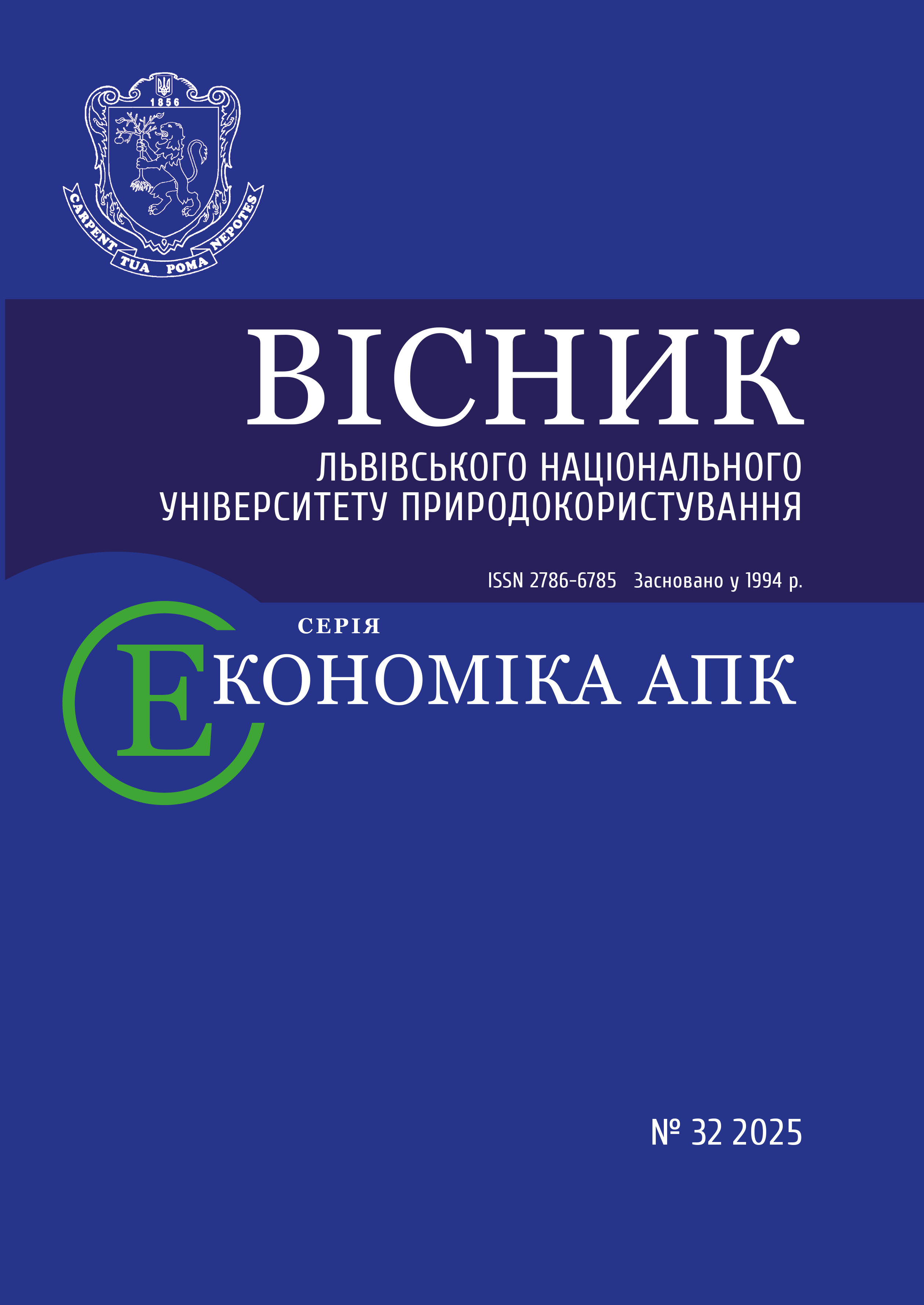DIGITAL TRANSFORMATION OF ACCOUNTING AND AUDITING BASED ON MODERN INFORMATION SYSTEMS
DOI:
https://doi.org/10.31734/economics2025.32.050Keywords:
accounting, auditing, digital transformation, information systems, cloud technologies, financial reporting, digital economyAbstract
The article explores the essence of digital transformation in accounting and auditing within the broader context of global economic digitalisation and the active integration of innovations in financial information management. It argues that traditional approaches to accounting and auditing are becoming increasingly ineffective due to the rising volume of data, the necessity for timely decision-making, and the growing demands for transparency in reporting. The study investigates the impact of modern information systems, including ERP solutions, cloud platforms, artificial intelligence, and machine learning technologies, on the automation of accounting processes and the enhancement of financial information quality. It analyses the advantages of cloud technologies, such as real-time access, reduced IT infrastructure costs, and the ability to integrate with other digital services. The article also highlights international experiences in implementing Standard Business Reporting (SBR) in countries with advanced digital infrastructures. Furthermore, it describes the state of digitalisation within the accounting sector in Ukraine, considering various industry and organisational differences. Particular emphasis is placed on the transformation of auditing, where tools such as Big Data, anomaly detection algorithms, blockchain, and digital platforms from leading auditing firms are increasingly utilised. The key benefits of digitalising auditing procedures are outlined, including improved accuracy, enhanced transparency, increased speed, and greater analytical depth of audits. However, the article also addresses several challenges, such as the necessity for digital competencies, the assurance of cybersecurity, adaptation to regulatory changes, and compliance with professional ethics. It posits that the digital transformation of accounting and auditing is not simply a technical upgrade but represents a strategic developmental direction, necessitating the integration of technological innovations, government support, and updated educational approaches.
References
Alles M. Drivers of the Use and Facilitators and Obstacles of the Evolution of Big Data by the Audit Profession. Accounting Horizons. 2015. Vol. 29. No 2. P. 439–449.
Appelbaum D., Kogan A., Vasarhelyi M. Big Data and Analytics in the Modern Audit Engagement: Research Needs. Journal of Information Systems. 2017. Vol. 31. No 3. P. 1–20.
Balaziuk O., Pyliavets V. Blockchain technology: Essence and areas of application. Economy and Society. 2022. No 43. https://doi.org/10.32782/2524-0072/2022-43-13.
Bardash S. V., Hrabchuk I. L. Digital technologies in accounting: Key opportunities and risks. Effective Economy. 2021. No 9. https://doi.org/10.32702/2307-2105-2021.9.18.
Chenash V. S., Abramov A. P., Shebeshten E. H. Development of accounting systems in Ukraine under the influence of digital technologies. Current Issues of Economic Sciences. 2024. No 3–4. https://doi.org/10.5281/zenodo.14011609
Digital transformation of business processes in Ukraine: Best practices of domestic business and modern challenges / L. Melnyk et al. Mechanism of Economic Regulation. 2024. Vol. 2. No 104. P. 54–60. https://doi.org/10.32782/mer.2024.104.07
Hevlych L. L. The accounting profession in the digital economy. Economics and Management Organisation. 2021. Vol. 3. No 43. P. 138–146. https://doi.org/10.31558/2307-2318.2021.3.13
ICAEW. Digitalisation of Accounting and Finance Functions. Institute of Chartered Accountants in England and Wales, 2020. URL: https://www.icaew.com (Accessed January 14, 2025).
IFAC. The Future of Accounting. International Federation of Accountants, 2021. URL: https://www.ifac.org (Accessed January 14, 2025).
Ionin Ye. Accounting and analytical support of business processes in the digital economy. Economic Analysis. 2023. Vol. 33. No 1. P. 172–191. https://doi.org/10.35774/econa2023.01.172/
Kononenko L. V., Nazarova H. B., Savchenko V. M. Organisation of accounting and auditing in the context of the use of modern digital technologies: Current state, problems and prospects. Problems of Modern Transformations. Series: Economics and Management. 2025. No 18. https://doi.org/10.54929/2786-5738-2025-18-09-03/
KPMG Clara. URL: https://kpmg.com/ua/uk/home/services/audit/kpmg-clara.html (Accessed January 15, 2025).
Kravchenko I. Y. Prospects for the implementation of digital economy tools in statistical analysis, accounting, and auditing systems. Accounting and Finance. 2022. Vol. 3 No 97. P. 12–20. https://doi.org/10.33146/2307-9878-2022-3(97)-12-20.
Kuz V. I. Development of accounting under the digitalisation of economic and management processes. Business Inform. 2021. No 6. P. 197–204. https://doi.org/10.32983/2222-4459-2021-6-197-204/
Lehenchuk S. F., Zavaliі T. O., Denysiuk O. M. Big Data in strategic management accounting. Problems of Theory and Methodology of Accounting, Control and Analysis. 2023. Vol. 3. No 56. P. 14–20. http://dx.doi.org/10.26642/pbo-2023-3(56)-14-20.
Nikolashyn A. O. Digital audit: Basic elements and innovative technologies. Investments: Practice and Experience. 2023. No 9. P. 75–80.
OECD (2016). Standard Business Reporting (SBR): Case Studies and Lessons Learned. Organisation for Economic Co-operation and Development. URL: https://www.oecd.org/gov/regulatory-policy/standard-business-reporting.pdf (Accessed January 15, 2025).
OECD releases fifth edition of Corporate Tax Statistics publication. URL: https://www.ey.com/en_gl/technical/tax-alerts/oecd-releases-fifth-edition-of-corporate-tax-statistics-publicat (Accessed January 17, 2025).
Putsenteilo P. R., Dovbush A. V. Main directions of accounting development in the digital economy. Innovative Economy. 2021. Vol. 3–4. No 87. P. 140–151. https://doi.org/10.37332/2309-1533.2021.3-4.
Semaniuk V, Melnyk N. The impact of digital technologies on the business information environment in the conditions of the Fifth Industrial Revolution. Bulletin of Economics. 2022. No 3. P. 203–212. https://doi.org/10.35774/visnyk2022.03.203.


